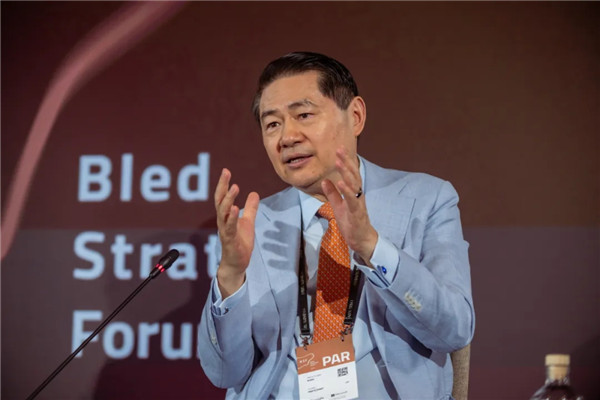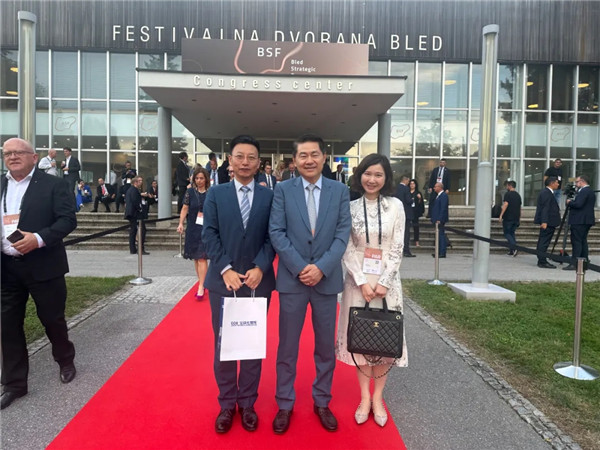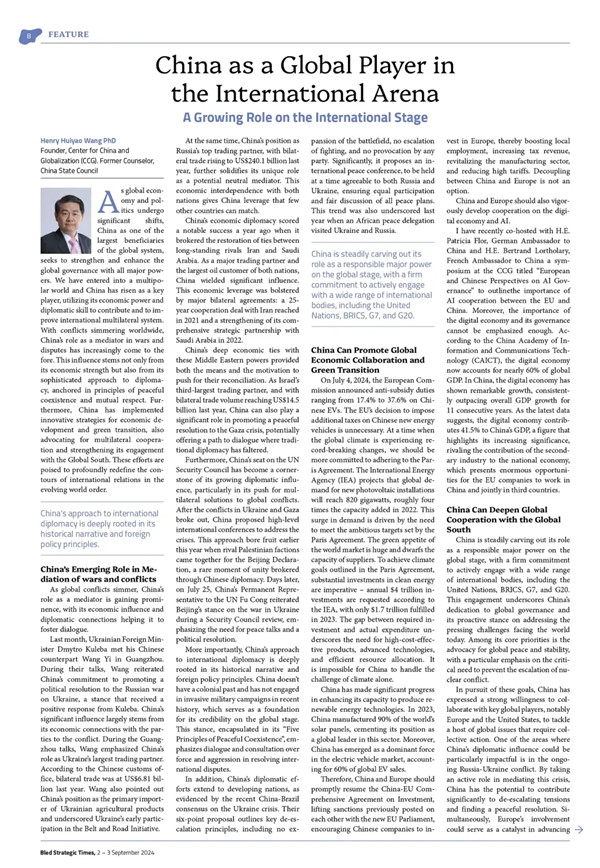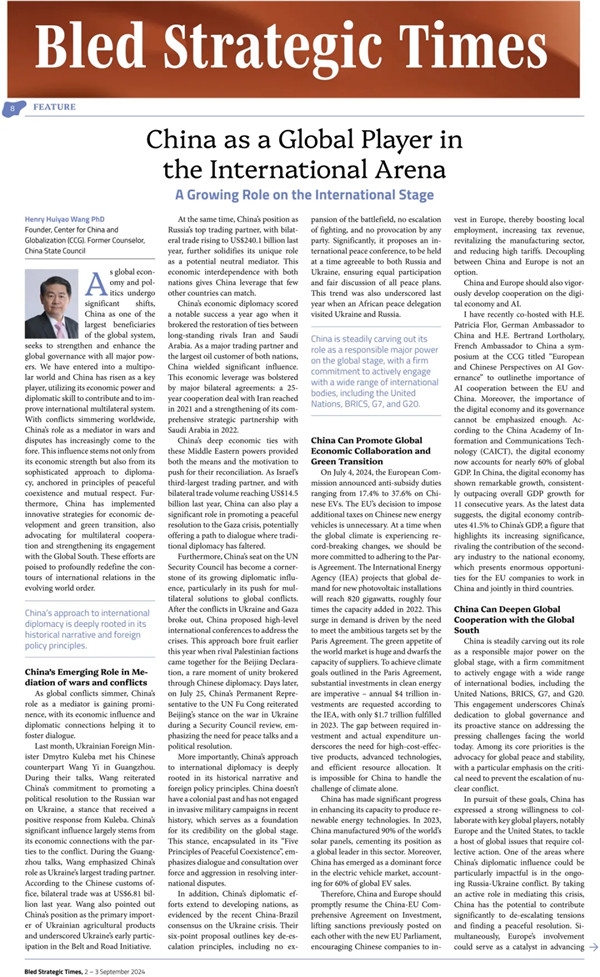Wang Huiyao: China as a Global Player in the International Arena
Bled Strategic Times | September 23 , 2024The annual Bled Strategic Forum international conference took place on 2 and 3 September 2024 in Bled, Slovenia under the title, “A World of Parallel Realities.” Representatives from the Center for China and Globalization (CCG), the only Chinese think tank invited to the event, included President Henry Huiyao Wang, Secretary-General Mabel Lu Miao, and John Zhao, Director of External Relations and Manager of the Global Young Leaders Dialogue program. Wang participated in the panel discussion on “Peace and Prosperity in the Indo-Pacific and the World,” while Zhao was the only participant from China in an inclusive diplomacy lounge.
Wang Huiyao also published an article in Bled Strategic Times, the official gazette of the Bled Strategic Forum (BSF), on China’s strategic efforts in fostering a multipolar world through economic strength and a sophisticated diplomatic approach.
China as a Global Player in the International Arena: A Growing Role on the International Stage

By Wang Huiyao | Founder of the Center for China and Globalization(CCG)
As global economy and politics undergo significant shifts, China as one of the largest beneficiaries of the global system, seeks to strengthen and enhance the global governance with all major powers. We have entered into a multipolar world and China has risen as a key player, utilizing its economic power and diplomatic skill to contribute and to improve international multilateral system. With conflicts simmering worldwide, China’s role as a mediator in wars and disputes has increasingly come to the fore. This influence stems not only from its economic strength but also from its sophisticated approach to diplomacy, anchored in principles of peaceful coexistence and mutual respect. Furthermore, China has implemented innovative strategies for economic development and green transition, also advocating for multilateral cooperation and strengthening its engagement with the Global South. These efforts are poised to profoundly redefine the contours of international relations in the evolving world order.
China’s Emerging Role in Mediation of wars and conflicts
As global conflicts simmer, China’s role as a mediator is gaining prominence, with its economic influence and diplomatic connections helping it to foster dialogue.
Last month, Ukrainian Foreign Minister Dmytro Kuleba met his Chinese counterpart Wang Yi in Guangzhou. During their talks, Wang reiterated China’s commitment to promoting a political resolution to the Russian war on Ukraine, a stance that received a positive response from Kuleba. China’s significant influence largely stems from its economic connections with the parties to the conflict. During the Guangzhou talks, Wang emphasized China’s role as Ukraine’s largest trading partner.
According to the Chinese customs office, bilateral trade was at US$6.81 billion last year. Wang also pointed out China’s position as the primary importer of Ukrainian agricultural products and underscored Ukraine’s early participation in the Belt and Road Initiative.
At the same time, China’s position as Russia’s top trading partner, with bilateral trade rising to US$240.1 billion last year, further solidifies its unique role as a potential neutral mediator. This economic interdependence with both nations gives China leverage that few other countries can match.
China’s economic diplomacy scored a notable success a year ago when it brokered the restoration of ties between long-standing rivals Iran and Saudi Arabia. As a major trading partner and the largest oil customer of both nations, China wielded significant influence. This economic leverage was bolstered by major bilateral agreements: a 25-year cooperation deal with Iran reached in 2021 and a strengthening of its comprehensive strategic partnership with Saudi Arabia in 2022.
China’s deep economic ties with these Middle Eastern powers provided both the means and the motivation to push for their reconciliation. As Israel’s third-largest trading partner, and with bilateral trade volume reaching US$14.5 billion last year, China can also play a significant role in promoting a peaceful resolution to the Gaza crisis, potentially offering a path to dialogue where traditional diplomacy has faltered.
Furthermore, China’s seat on the UN Security Council has become a cornerstone of its growing diplomatic influence, particularly in its push for multilateral solutions to global conflicts. After the conflicts in Ukraine and Gaza broke out, China proposed high-level international conferences to address the crises. This approach bore fruit earlier this year when rival Palestinian factions came together for the Beijing Declaration, a rare moment of unity brokered through Chinese diplomacy. Days later, on July 25, China’s Permanent Representative to the UN Fu Cong reiterated Beijing’s stance on the war in Ukraine during a Security Council review, emphasizing the need for peace talks and a political resolution.
More importantly, China’s approach to international diplomacy is deeply rooted in its historical narrative and foreign policy principles. China doesn’t have a colonial past and has not engaged in invasive military campaigns in recent history, which serves as a foundation for its credibility on the global stage. This stance, encapsulated in its “Five Principles of Peaceful Coexistence”, emphasizes dialogue and consultation over force and aggression in resolving international disputes.
In addition, China’s diplomatic efforts extend to developing nations, as evidenced by the recent China-Brazil consensus on the Ukraine crisis. Their six-point proposal outlines key de-escalation principles, including no expansion of the battlefield, no escalation of fighting, and no provocation by any party. Significantly, it proposes an international peace conference, to be held at a time agreeable to both Russia and Ukraine, ensuring equal participation and fair discussion of all peace plans. This trend was also underscored last year when an African peace delegation visited Ukraine and Russia.
China Can Promote Global Economic Collaboration and Green Transition
On July 4, 2024, the European Commission announced anti-subsidy duties ranging from 17.4% to 37.6% on Chinese EVs. The EU’s decision to impose additional taxes on Chinese new energy vehicles is unnecessary. At a time when the global climate is experiencing record-breaking changes, we should be more committed to adhering to the Paris Agreement. The International Energy Agency (IEA) projects that global demand for new photovoltaic installations will reach 820 gigawatts, roughly four times the capacity added in 2022. This surge in demand is driven by the need to meet the ambitious targets set by the Paris Agreement. The green appetite of the world market is huge and dwarfs the capacity of suppliers. To achieve climate goals outlined in the Paris Agreement, substantial investments in clean energy are imperative – annual $4 trillion investments are requested according to the IEA, with only $1.7 trillion fulfilled in 2023. The gap between required investment and actual expenditure underscores the need for high-cost-effective products, advanced technologies, and efficient resource allocation. It is impossible for China to handle the challenge of climate alone.
China has made significant progress in enhancing its capacity to produce renewable energy technologies. In 2023, China manufactured 90% of the world’s solar panels, cementing its position as a global leader in this sector. Moreover, China has emerged as a dominant force in the electric vehicle market, accounting for 60% of global EV sales.
Therefore, China and Europe should promptly resume the China-EU Comprehensive Agreement on Investment, lifting sanctions previously posted on each other with the new EU Parliament, encouraging Chinese companies to invest in Europe, thereby boosting local employment, increasing tax revenue, revitalizing the manufacturing sector, and reducing high tariffs. Decoupling between China and Europe is not an option.
China and Europe should also vigorously develop cooperation on the digital economy and AI.
I have recently co-hosted with H.E. Patricia Flor, German Ambassador to China and H.E. Bertrand Lortholary, French Ambassador to China a symposium at the CCG titled “European and Chinese Perspectives on AI Governance” to outlinethe importance of AI cooperation between the EU and China. Moreover, the importance of the digital economy and its governance cannot be emphasized enough. According to the China Academy of Information and Communications Technology (CAICT), the digital economy now accounts for nearly 60% of global GDP. In China, the digital economy has shown remarkable growth, consistently outpacing overall GDP growth for 11 consecutive years. As the latest data suggests, the digital economy contributes 41.5% to China’s GDP, a figure that highlights its increasing significance, rivaling the contribution of the secondary industry to the national economy, which presents enormous opportunities for the EU companies to work in China and jointly in third countries.
China Can Deepen Global Cooperation with the Global South
China is steadily carving out its role as a responsible major power on the global stage, with a firm commitment to actively engage with a wide range of international bodies, including the United Nations, BRICS, G7, and G20. This engagement underscores China’s dedication to global governance and its proactive stance on addressing the pressing challenges facing the world today. Among its core priorities is the advocacy for global peace and stability, with a particular emphasis on the critical need to prevent the escalation of nuclear conflict.
In pursuit of these goals, China has expressed a strong willingness to collaborate with key global players, notably Europe and the United States, to tackle a host of global issues that require collective action. One of the areas where China’s diplomatic influence could be particularly impactful is in the ongoing Russia-Ukraine conflict. By taking an active role in mediating this crisis, China has the potential to contribute significantly to de-escalating tensions and finding a peaceful resolution. Simultaneously, Europe’s involvement could serve as a catalyst in advancing China-US relations, fostering a more constructive dialogue and cooperation between these two major powers. Through such multilateral efforts, China demonstrates its commitment to a balanced and pragmatic approach to international relations, aiming to build bridges and reinforce global stability in an increasingly complex world.
China has been collaborating with members of the Global South to balance the gap between developing and developed countries. China, as a founding member of BRICS, has engaged heavily with developing countries in commerce and trade through BRICS. This BRICS mechanism is an increasingly influential force in the global financial sector and political security. Measured by purchasing power parity, the BRICS countries have already outpaced the G7, accounting for 35.6% of the world’s GDP compared to the G7’s 30.3%. By 2028, this disparity is projected to grow even more in favor of the BRICS, with estimates showing a ratio of 36.6% to 27.8%. The robust intra-BRICS economic cooperation attracted more “middle power” nations to join. For example, in June, Turkish Foreign Minister Hakan Fidan discussed his country’s pursuit of new opportunities to cooperate with BRICS in a speech at the Center for China and Globalization (CCG), a non-governmental think tank in Beijing.
Conclusion
In conclusion, China’s evolving role as a mediator in global conflicts underscores its growing influence on the international stage. By leveraging its economic ties and diplomatic principles, China has positioned itself as a key player in fostering dialogue and promoting political resolutions, as seen in its involvement in the Ukraine-Russia conflict and its successful mediation between Iran and Saudi Arabia. China’s commitment to peaceful coexistence, coupled with its innovative approaches to economic development and green transition, further solidifies its leadership in shaping a new world order. As China advocates for multilateral cooperation and continues to deepen its engagement with the Global South, its efforts will likely play a pivotal role in redefining the contours of international relations in the years to come.
From Bled Strategic Times, 2024-9-2
Recommended Articles
-

Wang Huiyao: The 21st-century order has outgrown 20th-century institutions
-
Wang Huiyao: Beyond Blocs-Europe and China will not align nor compete, but selectively cooperate
-
Wang Huiyao: Key lessons from China’s ascent over the past 25 years
-
Wang Huiyao: Key lessons from China’s ascent over the past 25 years
-
Wang Huiyao: China and Latin America: Partners in a shared new era



